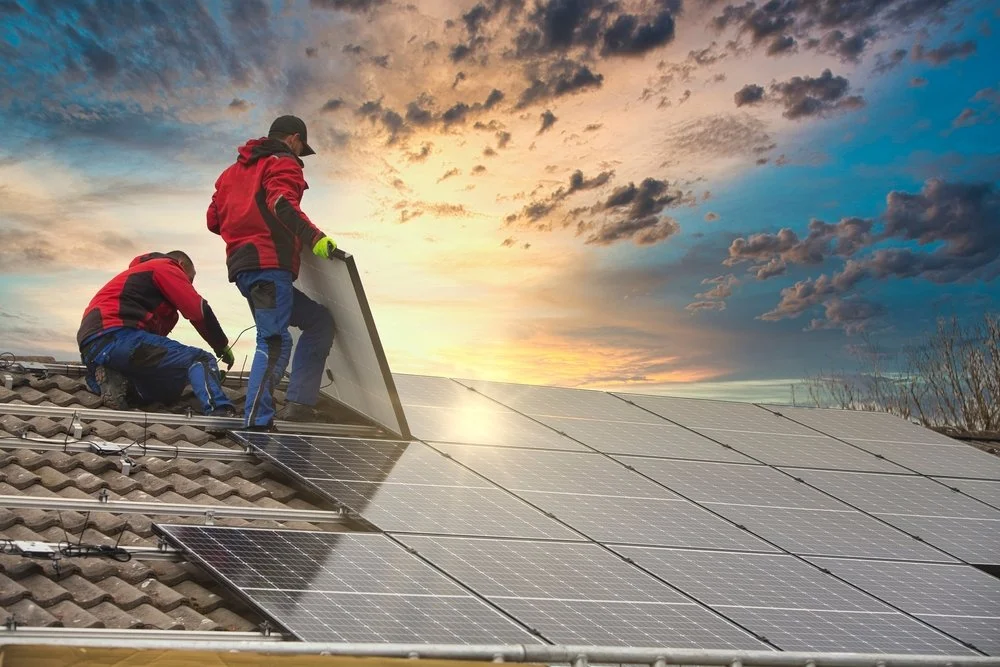Did you know, four in ten homes in Britain are now being built with solar panels?
This is due to the stringent building regulations in the UK. You might have noticed new properties with solar panels on their roofs when driving around. According to Solar Panel Portal, that means the number has risen over three times in the past year.
Studies have also found that solar panels can help cash-strapped households cut their energy bills by at least 24%.
Jem Energy specialise in solar panel installations across the UK. So what do you know before considering upgrading your property?
Key Factors to Consider Before an Installation
We appreciate that switching to solar energy is a big decision. Our team is always happy to talk you through the basics, from understanding how solar panels work to assessing how suitable your home is and how much it will cost.
How Do Solar Panels Work?
Solar panels generate electricity by converting sunlight into usable power through photovoltaic (PV) cells.
These cells absorb sunlight and produce direct current (DC) electricity, which is then converted into alternating current (AC) by an inverter. This makes it suitable for use in your home. Any excess energy can be stored in batteries or sent back to the grid.
If this is something you’re interested in, Jem Energy can also provide you with the latest battery storage.
Is Your Home Suitable for Solar Panels?
Before investing in solar panels, assess whether your home is a good fit for solar energy. Key considerations include:
The Condition of Your Roof and Available Space. A roof should be in good condition and have enough space for the panels. If it needs repairs soon, it’s best to fix it before installation.
Exposure to Sunlight. South-facing roofs get the most sunlight in the UK. Shading from trees, buildings, or chimneys can reduce efficiency.
The Local Climate. While solar panels still work in cloudy conditions, they generate less power compared to sunnier regions.
How Much Do Solar Panels Cost in the UK?
The cost of solar panels varies depending on size, brand, and installation. In the UK, a typical 3-4 kW system costs between £5,000 and £8,000, including installation. However, government incentives and grants can help to reduce costs, and it’s important to remember you will save money afterwards..
Financial Benefits of Solar Panels
Although the upfront cost can be high, solar panels provide long-term financial benefits:
Lower Energy Bills: Generating your own electricity reduces reliance on the grid.
Smart Export Guarantee (SEG): You can earn money by selling unused electricity back to the grid.
Adding Value to your Property: Homes with solar panels are often more attractive to buyers.
Solar Panel Maintenance & Lifespan
Solar panels require minimal maintenance. Regular cleaning to remove dirt and debris ensures maximum efficiency. Most panels last 25–30 years, with manufacturers offering warranties of 20–25 years. The inverter, however, may need replacing after 10–15 years.
Grid-Tied vs. Off-Grid Systems
There are two main types of solar power setups:
Grid-Tied: Connected to the national grid, allowing you to draw electricity when needed and sell excess power.
Off-Grid: Requires batteries for storage and is ideal for remote locations but has higher upfront costs.
Most UK homeowners opt for grid-tied systems due to their cost-effectiveness and access to the Smart Export Guarantee.
Government Incentives & Grants
The UK government offers financial incentives to encourage solar energy adoption. The Smart Export Guarantee (SEG) allows homeowners to sell surplus electricity to energy suppliers. Additionally, VAT on solar panel installations has been reduced to 0% until 2027.
Why the Right Installer is Key
Choosing a certified installer is crucial to ensure safety and efficiency. The best way is to look for companies accredited by the Microgeneration Certification Scheme (MCS). You can rest assured that Jem Energy is MCS approved installer and always works to the finest standards.
Why it’s Important to Choose an MCS Approved Installer
Choosing an installer accredited by the Microgeneration Certification Scheme (MCS) ensures quality, reliability, and compliance with industry standards.
Because we have MCS certification, that ensures our installers follow best practices and that the solar panels meet safety and performance requirements.
Furthermore, many financial incentives, such as the Smart Export Guarantee (SEG), require MCS-approved installations to qualify. Working with an accredited company also provides consumer protection, ensuring warranties and guarantees are upheld.
Without MCS certification, you risk poor workmanship, substandard equipment, and potential eligibility issues for government incentives. Always verify an installer’s credentials before proceeding with a solar panel installation.
Run Your Home for Less in 2025
Installing solar panels is a smart investment for cutting energy costs and reducing environmental impact.
However, as we have explored, you must find out if your home is suitable, understand the costs, and be careful when choosing an installer. With government incentives available, now is a great time to consider making the switch to solar energy.
To start the process of your solar panel installation, find out more about Jem Energy. Or simply contact our friendly team today.



